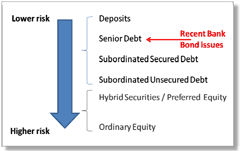Bonds – Strategies for income (cont.)
With the increase in the cost of funding globally and changes in legislation making it easier to offer bonds to retail investors, Bond issues are on the rise.
We look at whether the wave of new bank bond IPOs are worth considering.
If you have never heard of corporate bonds, you are not alone. The regulation surrounding the issuance of these products has until recently been cumbersome. As a result, new issues have until recently typically been aimed at the wholesale sector. However, recent easing of paperwork on new issues has meant that bonds issuance is being more readily offered to retail investors.
Since the GFC, the cost of lending has gone up considerably and companies are looking for alternative funding routes. Bond issuance has provided a readily accessible alternative, allowing investors to benefit from the current high cost of lending.
We have seen a number of issuances towards the end of last year, from Healthscope Notes, which we consider to be higher risk bonds, paying a fixed return of 11.25%pa to the opposite end of the spectrum with CommBank Retail Bonds, paying a floating rate of 6.05% pa (1.05% over the 90 day Bank Bill Swap Rate).
Bank Bond Offers
Bond FAQs
What are corporate bonds? In its simplest form a corporate bond is a loan to a company. In exchange the company agrees to repay you a fixed or floating rate of interest for a fixed period of time, after which, it will need to repay the original amount borrowed.
What is a floating rate? Bonds pay either a fixed or floating interest rate (coupon), those offering a floating rate will typically link this to the BBSW, allowing you take advantage of anticipated rises in interest rates.
What is the Bank Bill Swap Rate (BBSW)? The Bank Bill Swap Rate is the rate that the major banks lend money to each other at. Whilst this moves on a daily basis, this typically tracks the RBA cash rate.
Why are the yields being offered much lower than the Hybrids I own? Whilst Hybrids generally offer similar income benefits such as fixed or floating rates, it is important to note that Bonds offer more security. In the event of insolvency, Hybrids are typically paid out just before shareholders, whereas Bonds are often ranked as Senior Debt.
Each Bond is different, so you should look closely at where the Bond sits in the capital structure and whether the company can suspend payments. e.g. The recent bank Bond issues only allow suspension of payments in the event of insolvency.
With huge swathes of money currently sitting on deposit, many investors have naturally, compared the yields on offer to those available from their bank. We feel that the bank bonds currently being issued are reasonably attractive on a number of measures;
Interest rests. Most term deposits for periods of 12-months or longer pay interest only once a year. Bonds typically pay interest (coupons) quarterly, meaning investors can reinvest their coupons quarterly to uplift their overall return.
Liquidity. Listed bonds can be bought and sold easily on market without penalty*. A change in circumstances for a term deposit investor leading to an unexpected requirement for funds can mean a hefty claw back of interest (break fees) by the Bank if early access to the term deposit is required. Compare break fees for a five year term deposit if access is required after, say, two years, with the cost of selling your bonds via the ASX.
Potential for capital gain. If the bond price rises above its issue price, the holder has the option of locking in a capital gain by selling his/her holding on the ASX. Several events, including a further tightening in credit spreads, could move the price higher.
Benefit from rises in interest rates. Investors should take note whether the rate on offer is floating (variable) or a fixed rate bond. The recent issues have tended to favour floating rates, allowing investors to capture any further interest rate rises over the life of the bonds. Interest rates (coupons) on the bonds are typically tied to the 90-day Bank Bill Rate which moves up and down with the cash rate.

Comment: